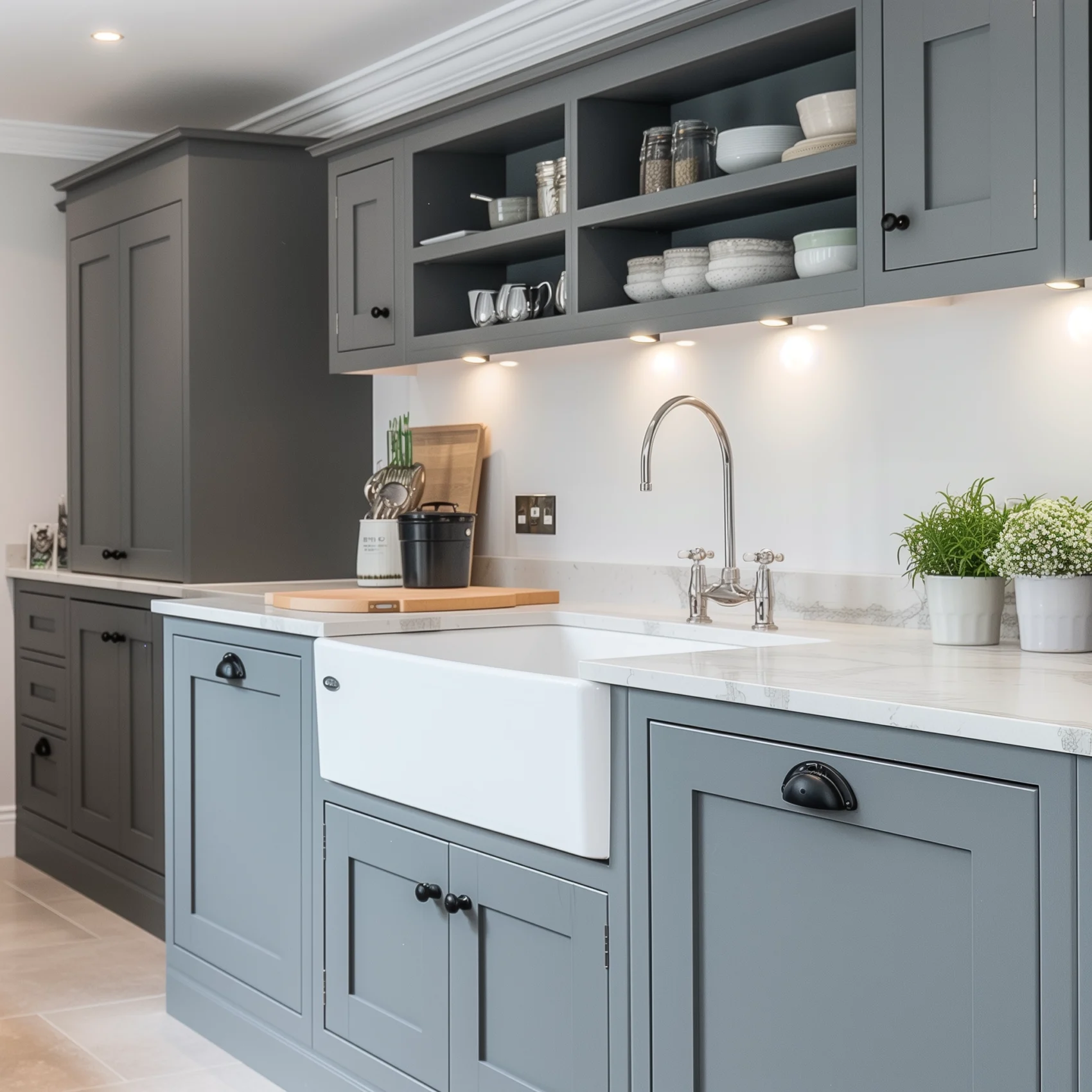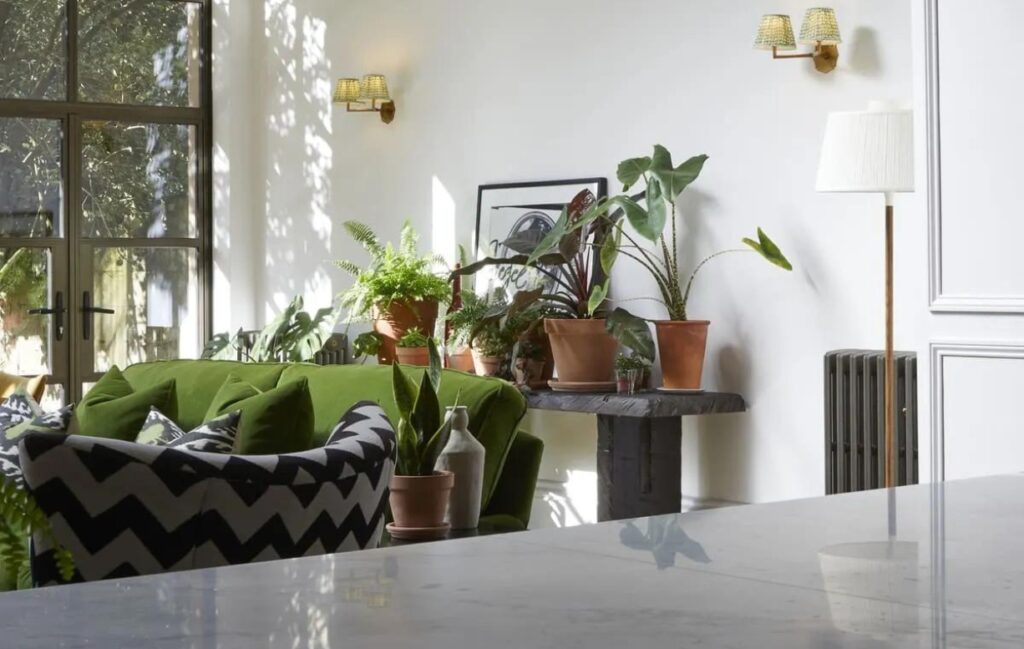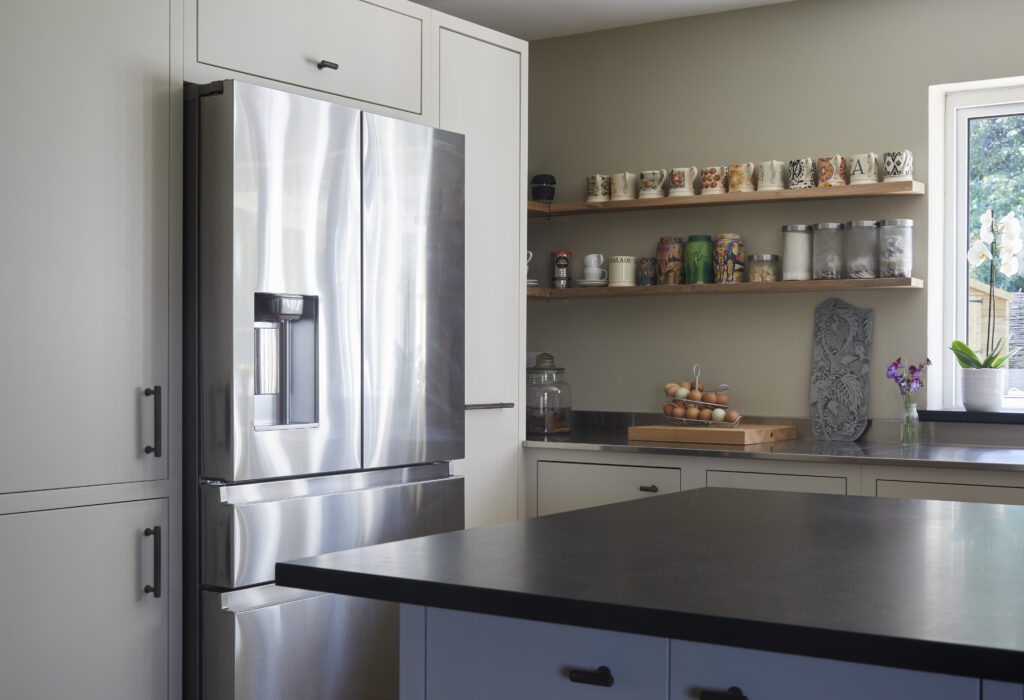
Traditional English handmade kitchens are defined by an exquisite blend of skillful craftsmanship and stunning kitchen design, underlining a level of inspiration that is as exclusive as the homeowner’s personal style tastes. Each kitchen piece, from cabinets to cupboards, work surfaces and even meticulously designed taps, is attentively handcrafted by us, ensuring perfect fit and the impeccable finish that factory-made kitchens often lack. This doesn’t only result in aesthetically pleasing units but also guarantees a long-lasting functionality that can stand years of use. Our logo, representing countless bespoke projects, places a seal of expertise and distinction on every project. Now, let’s delve into what it takes to bring these masterpieces to life.
English handmade kitchens are distinguished by their bespoke craftsmanship, attention to detail, and use of high-quality materials such as solid hardwood in our projects. Each kitchen is custom-made to fit individual spaces and designed to reflect traditional English carpentry, resulting in timeless elegance and durability.
The Craftsmanship Advantage in English Handmade Kitchens
Craftsmanship is at the heart of every traditional English handmade kitchen project. When you step into a kitchen designed and assembled by us, you’re entering a space filled with bespoke elements crafted to near perfection. Each cabinet, drawer, countertop, and fixture is meticulously crafted by skilled hands, making it a unique piece tailored specifically to your needs and preferences.
The attention to detail in each part of the kitchen is what truly sets it apart. Consider a cabinet door: A skilled craftsman carefully selects the wood, shaping and smoothing it by hand to achieve a flawless finish. Moreover, unlike mass-produced factory-made options, where uniformity sometimes compromises quality, the handmade approach allows for greater customization and individual character in every piece.
Tailored Designs
In an English handmade kitchen crafted by us, no two designs are exactly alike. Our inspiration draws from your unique style, ensuring that each furniture piece is perfectly fitted and finished to the highest standard. The result is a kitchen that seamlessly integrates into your home and reflects your unique style and taste.
For instance, a farmhouse-style cupboard in one of our projects would showcase the classic allure of traditional Georgian furniture, while incorporating modern functionality meticulously designed for your daily use. The utilisation of solid hardwood and carefully chosen finishes underscores our commitment to both durability and aesthetics.
The meticulous handiwork extends beyond just the visual appeal. It directly influences the functionality and resilience of the kitchen as well. Solid birch cheeks and shelves, along with tongue and groove hardwood backboards, create a balance of traditional and engineered materials that contribute to the longevity of our kitchen design projects.
This craftsmanship advantage doesn’t just stop at physical appearances; it translates into quality performance over time as well. The durability of traditional English handmade kitchens speaks to why they are sought after as long-term investments in households.
The unparalleled dedication to detail in our English handmade kitchen projects is not only evident in their exquisite appearance but also in their robustness and longevity, providing homeowners with finely-crafted spaces infused with timeless charm and functionality.

Key Materials in English Handmade Kitchen Construction
When it comes to traditional English handmade kitchens, the choice of materials is as essential as the craftsmanship itself. Let us delve into the key materials that form the foundation of these exquisite kitchens, beginning with solid hardwoods.
Solid Hardwoods
The timeless allure of oak, maple, and cherry serves as a cornerstone of traditional English handmade kitchens. These woods are prized for their exceptional durability and natural aesthetic appeal. Oak, with its distinctive grain patterns, exudes robustness and character, making it a popular choice for cabinet doors, frames, and structural elements. On the other hand, maple and cherry offer a more refined appearance, lending themselves well to intricate detailing and decorative accents. Some kitchen designs also incorporate these woods into pantry storage ideas, enhancing the functionality of the space.
Furthermore, it’s important to note that solid hardwoods not only contribute to the visual charm of these kitchens but also ensure their longevity. Their inherent strength and resistance to wear make them a practical choice for surfaces that are subjected to daily use and exposure. These materials stand up well to the enquiries of a bustling family kitchen.
High-Quality Joinery
In the realm of English handmade kitchens, the art of joinery is paramount. Mortise and tenon joints, dovetail joints, and other traditional joinery techniques serve as testament to the dedication towards achieving structural integrity and longevity in kitchen construction. These techniques involve precise cutting and fitting of wood without relying solely on adhesives or mechanical fasteners. Fabricating a round kitchen island, for instance, would demand careful joinery for seamless integration.
The result is a seamless integration of components that endows each piece of furniture with unparalleled strength and stability. Through meticulous attention to detail, craftsmen ensure that these joints withstand the test of time, upholding the philosophy of creating enduring pieces that can be cherished for generations – a work of art appreciated by every member of the family.
Paint and Finish
When it comes to preserving and enhancing the natural beauty of wood, the choice of paints and finishes holds great significance. In traditional English handmade kitchens, a preference for water-based paints and natural finishes is deeply rooted in an environmental consciousness that aligns with sustainable practices.
These eco-friendly options not only minimise the impact on the environment but also accentuate the unique characteristics of the wood. They allow the inherent textures and tones of the chosen hardwoods to shine through, fostering a deeper connection with nature within the heart of the home. Moreover, their application ensures lasting protection against wear while simultaneously offering easy maintenance—making both pantry and kitchen island storage units practical and aesthetically pleasing—a testament to both practicality and aesthetic finesse.
In essence, each material carefully selected for an English handmade kitchen reflects a harmonious blend of tradition, functionality, and aesthetic refinement—transcending mere components to become integral elements in narrating the tale of timeless craftsmanship and design excellence. This embraces the storage considerations of the family, producing kitchens that effectively merge beauty and function.
Now equipped with a deeper understanding of the materials central to these kitchens’ masterful construction, we shift our focus towards exploring the diverse spectrum of styles ranging from traditional to bespoke, ready to serve your family’s multifaceted needs and stylistic preferences.
Style Spectrum: Traditional to Bespoke
When it comes to traditional English handmade kitchens, there’s a rich tapestry of options designed to cater to a variety of tastes and preferences. From classic and timeless Georgian designs to more contemporary and bespoke choices, the selection is as broad as the tastes and styles of the homeowners who seek them. Each design, whether it’s a pantry or island, opens up new possibilities for storage and gives a unique insight into the art of handmade kitchen craftsmanship.
For those who favour the elegance and grace of times gone by, the classic and traditional Georgian designs offer a deep connection to England’s rich heritage. These kitchens celebrate craftsmanship, symmetry, and balance, all while showcasing refined woodwork and meticulous attention to detail. The families who treasure these designs are invariably drawn to the commitment to tradition and the charm these kitchens cultivate.In the vast arena of kitchen designs in the UK, for those seeking a more personalised touch, bespoke options provide an opportunity to create a family kitchen tailored to their collection of specific needs.
One might argue that traditional styles are too rigid or old-fashioned for today’s homes, but it’s essential to recognise that they bring a sense of timeless charm and quality that can enhance any residence, even in the UK. On the other hand, bespoke designs offer ultimate freedom in creating a kitchen space tailored precisely to one’s lifestyle, palette of preferences and the needs of a client.
Imagine walking into a kitchen adorned with classic Georgian cupboards—each perfectly handcrafted with meticulous attention to detail by experienced designers. The warm hues of wood invoke images of vintage English countryside estates. On the other hand, picture a sleek, modern bespoke design with clean lines, custom finishes and trendy accessories that reflect the homeowner’s individuality.
Both traditional and bespoke styles hold their own unique appeal, catering to the UK market’s different sensibilities. It’s not about which is better; rather, it’s about finding the perfect fit for your home and lifestyle – whether you prefer the grandeur of tradition or the personalised touch of bespoke design.
The door styles, hardware choices, and finish options further contribute to this diverse range of styles. Homeowners can select from an array of finishes such as painted or stained wood that complements their home’s architecture and aesthetic preferences. Whether it’s brushed nickel hardware for a contemporary edge or antique brass for a classic touch, these accessories add personality and character to every custom-made kitchen.
In conclusion, English handmade kitchens cater to an array of style preferences. From traditional Georgian designs that evoke nostalgia for Old England to bespoke options in the form of a curated collection of avant-garde styles that boast modern individuality, these kitchens serve as more than just cooking spaces; they embody personal taste and lifestyle.
English Handmade Kitchen Vs. Factory-Made: A Comparison
When it comes to choosing a kitchen, there are many factors a potential UK client should consider, from the level of customization to the quality of construction and uniqueness of the final product. Let’s explore the key differences between traditional English handmade kitchens and factory-made ones in terms of customization, construction quality, and uniqueness.
Customization
In traditional English handmade kitchens, customization is a cornerstone. Customers have the ultimate flexibility in tailoring every aspect of their kitchen, from the size and layout of the cabinets to the materials and finishes used. This level of personalization ensures that the kitchen perfectly fits the individual needs and preferences of the UK client, making each kitchen a unique piece in the designers’ portfolio. On the other hand, factory-made kitchens often come in standard sizes and styles with limited or no options for customization. This lack of flexibility can lead to compromises and may not fully cater to the specific requirements of the homeowner.
Quality of Construction
Craftsmanship and durability are defining features of traditional English handmade kitchens. These kitchens are built to last using time-honoured carpentry techniques and solid hardwood materials such as oak, maple, or cherry. The meticulous attention to detail and commitment to quality ensure that every piece is resilient and enduring. In contrast, factory-made kitchens in the UK may utilise engineered materials like MDF and particleboard along with mass production methods. While these materials can be functional, they may not offer the same level of solidity and longevity as the solid wood used in handmade kitchens.
Uniqueness
Each traditional English handmade kitchen is a unique creation, reflecting the vision and personality of the homeowner. From subtle design elements like bespoke knobs and brackets on cabinets to major architectural features like a designer sink, every detail is carefully crafted to meet specific needs and desires. One might even peruse showrooms to choose from collections of these elements, for the ultimate bespoke touch. This attention to detail adds an unparalleled sense of individuality to the kitchen space. Conversely, factory-made kitchens lack this distinctive essence, often appearing uniform and lacking in character. The cookie-cutter approach of factory-made kitchens means they miss out on the personal connection that comes with a custom design tailored to an individual’s lifestyle.
With these points in mind, it becomes clear that traditional English handmade kitchens, with their collections of brackets, knobs, designer sinks, and more, stand apart in terms of offering extensive customization, superior construction quality, and a distinctive touch that sets them apart from factory-made alternatives.
Now equipped with a discerning eye for craftsmanship, and having toured designer showrooms, let’s turn our attention to investigating the cost implications of embracing such excellence within your home.

What Does an English Handmade Kitchen Cost?
Introducing a stunning English handmade kitchen into your home, with every bracket and knob meticulously chosen and placed, is a declaration of your taste and demonstrates a commitment to quality. This bespoke addition is not just about functionality; it’s about the artistry that elevates your living space. However, when it comes to making such an investment, it’s crucial to understand what kind of financial commitment you are looking at. Let’s take a detailed journey into exploring the cost of these remarkable works of craftsmanship.
The overall cost of an English handmade kitchen is influenced by a variety of factors, the three main ones being size, materials, and level of customization. Larger kitchens will typically require more materials and labour, thus driving up the total cost. Similarly, the choice of materials and their quality can significantly impact the price. Whether it’s the rich warmth of natural wood or the sleek elegance of custom metals, each material contributes differently to the overall look and feel of the space. Finally, the extent to which the design is customised to fit your specific needs and preferences, possibly picked from designer collections in high-end showrooms, will also play a role in determining the final cost.
Factors Influencing Cost
| Factor | Influence On Cost |
| Size | Determines materials and labour required |
| Materials | Choice impacts aesthetics and quality |
| Level of Customization | Unique designs require additional time and skill |
When it comes to fully bespoke English handmade kitchens, prices generally range from £30,000 to £70,000. This broad range accounts for a wide variety of design options tailored to meet individual needs and design preferences. It’s important to note that this price range reflects investment-level decisions and caters to those who value exceptional craftsmanship and distinctive design in their homes.
To put this into perspective, for £30,000 – £70,000, you are not only purchasing a kitchen with carefully selected knobs, brackets and designer sinks, but also investing in a piece of art that has been meticulously crafted to your exact specifications. Your kitchen becomes a personalised masterpiece, reflecting your unique style and functional requirements.
By visiting our website, you can explore various cost examples and gain further insight into the factors that influence the pricing of these bespoke kitchens. Understanding these intricacies, as well as the quality and craftsmanship behind every knob, bracket, sink, and item in our collections, will help you appreciate both the subtleties and grandeur associated with owning an English handmade kitchen—making it truly irreplaceable in value.
As we peel back the layers on exquisite craftsmanship and design, a crucial aspect follows – preserving its beauty for years to come through thoughtful care. Let’s now shift our focus to unravelling the secrets of maintaining the allure and functionality of your distinguished handmade kitchen.
Preserve the Beauty: Caring for Your Handmade Kitchen
Owning a traditional English handmade kitchen is owning a piece of art. Like any exquisite possession, it needs care to maintain its beauty and functionality for years to come. The natural finishes and delicate craftsmanship demand extra attention and special handling.
Taking care of your handmade kitchen involves gentle maintenance to preserve its timeless appeal. Remember, these are not just any cabinets or countertops; they are masterpieces waiting to be cherished and cared for.
First off, regular dusting is crucial in ensuring the longevity of your kitchen. Each surface needs to be gently wiped down with a soft, dry cloth to prevent the build-up of dirt and debris. Since these kitchens are made from solid hardwood, using a damp cloth sparingly can help remove any stubborn spots without damaging the natural finishes.
It’s important to avoid harsh chemicals that can easily damage or wear away the wood and finishes.
Moreover, using gentle cleaning solutions specifically designed for wooden surfaces will help maintain the pristine condition of your kitchen. There’s no need for abrasive cleaners; simple mixtures of mild soap or vinegar diluted in water should do the trick.
Remember that water is wood’s worst enemy if it’s allowed to puddle on a surface. Therefore, always ensure you wipe any spills immediately with a dry cloth and follow up with a clean damp one for good measure.
This care doesn’t need to be complicated; it’s about being consistent and respecting the quality materials used. Homeowners who visit our website have access to comprehensive care guides and valuable tips specifically tailored towards preserving the breathtaking appeal of their handcrafted kitchen.
Ultimately, showing ongoing respect and care for your English handmade kitchen will ensure that every detail, from the finish on the doors to the edge profile on your worktops, maintains its original beauty for years to come.
Design your dream kitchen here.